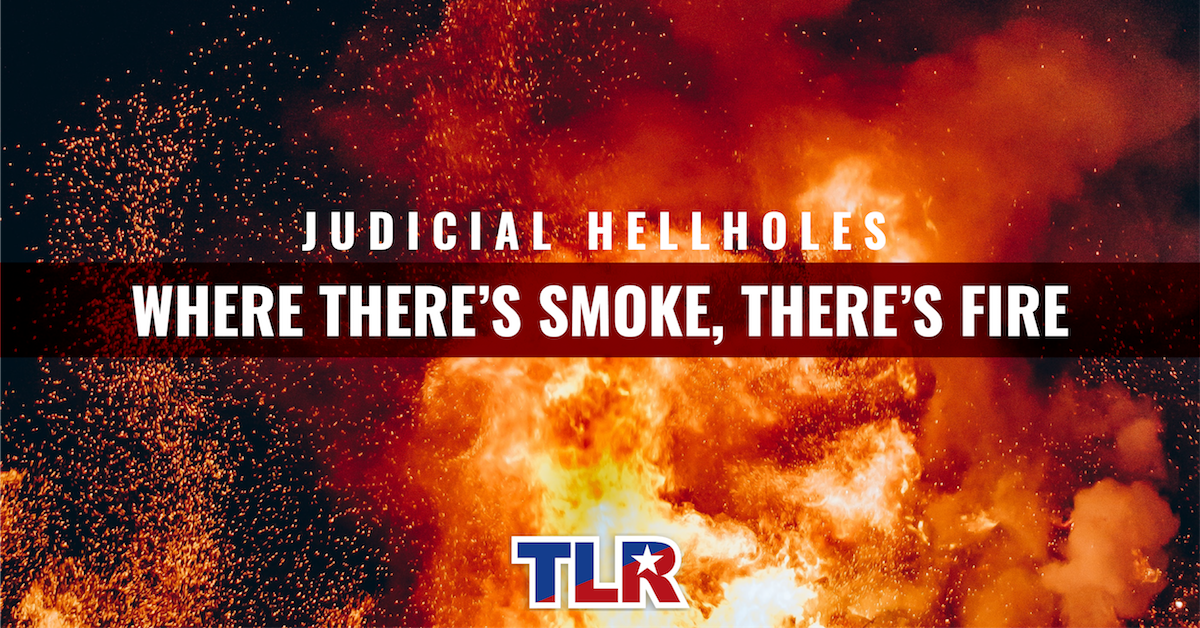
By: Lucy Nashed, TLR Communications Director
For watchdogs of the Texas legal system, the American Tort Reform Association’s annual Judicial Hellholes report provides some good news and some bad news.
The good news is that Texas has successfully avoided being named the worst of the worst for the second year in a row, since storm-chasing lawyers propelled us to a Hellhole designation in 2016. The bad news is that two massive 2018 verdicts from Texas trial courts landed us on this year’s Dishonorable Mention list.
And as they say, where there’s smoke, there’s fire.
The first verdict came in August 2018, when a Dallas trial court awarded $241 million to a couple whose children were seriously injured in a car accident. The jury found that the car’s seats were defective and unreasonably dangerous. The jury assigned 95 percent of the responsibility for the plaintiffs’ injuries to Toyota and assigned only five percent of the responsibility to the distracted driver who caused the crash. According to the ATRA report, the jury found liability and awarded damages even though “the product exceeded federal safety standards, there was no evidence of a safer alternative design, and the court had refused to allow Toyota to present its own expert rebuttal testimony.”
The second verdict came only two months later, when a San Antonio trial court handed down the largest verdict in the U.S. in 2018. The $740 million judgement against Amrock, a title insurance and property valuation company, found that it maliciously misappropriated trade secrets held by a startup company called HouseCanary.
There’s just one problem.
“Texas law does not allow the award of speculative damages. For that reason, it is very difficult for a company that has shown modest profits to recover a significant amount of money for lost future profits. But the restrictive nature of Texas’s law on lost-profits damages did not impede the trial court from signing a historic judgment in favor of a start-up company with virtually no history of success in the market.”
The Judicial Hellholes report is one voice in a swelling chorus of concern about the quality of Texas’ judicial system. The U.S. Chamber of Commerce Institute for Legal Reform’s report on the cost of litigation to Texas families noted a weakness in Texas’ judges and juries, while both CNBC and Forbes gave lackluster rankings for Texas’ legal system in their listings of the best states to do business.
Collectively, they shine a spotlight on a weak point in Texas’ legal system, which is that we have too many trial judges who are either lazy, incompetent, biased or corrupt.
Common-sense lawsuit reforms are only as good as the judges who apply the laws. Part of what earned Texas the designation of the Wild West of Litigation in the 1970s and 1980s was activist judges who produced results according to their own sense of “justice” rather than conducting trials impartially and applying our laws as written.
While we have not yet reached the level of a four-alarm blaze, the partisanship that swept out many experienced incumbent appellate judges in November is a spark that has the potential to engulf our legal system—and ultimately our economy—in flames.
There is still time to extinguish this fire and protect the balanced civil justice system and strong economy that Texas has built over the last 25 years. TLR is committed to that fight.
